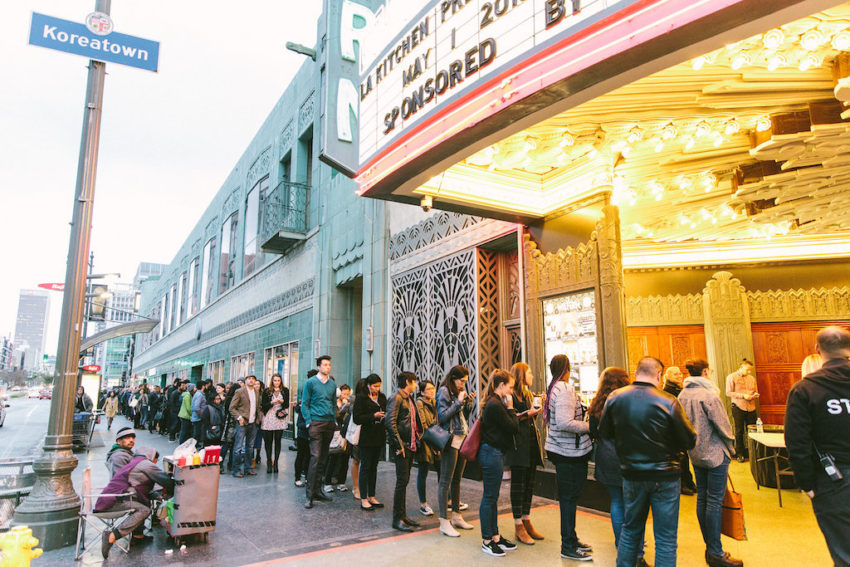
The line outside the Wiltern Theater for The Power of Food panel discussion.
LOS ANGELES, CA (LA ELEMENTS) 5/18/2018 – “My name is Jose Andres. I am a cook and for a few years I have been very lucky to be part of this amazing Los Angeles family. And today I am probably more excited than ever.”
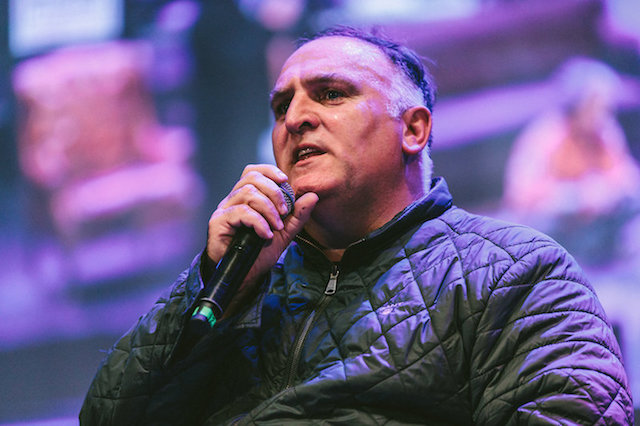
Chef Jose Andres
Chef Jose Andres was introduced by the Los Angeles Times restaurant critic, Jonathan Gold. Andres made his remarks before an adoring and enthusiastic crowd that had gathered at the Wiltern Theater for The Power of Food event held in conjunction with LA Kitchen in Los Angeles on May 1. They came to celebrate the official start of LA Food Bowl 2018. the month-long celebration of cuisine representing the cultural diversity of Los Angeles presented by The Los Angeles Times. They came to enjoy tasty dishes created by class 14 of the LA Kitchen, and they came in the hopes of meeting the man whose restaurants (minibar, The Bazaar) have earned him a legendary status in the world of fine dining. Andres is also widely acclaimed for his humanitarian work. His non-profit, World Central Kitchen brings food to areas devastated by natural disasters such as Puerto Rico, and has earned him recognition as one of Time Magazine’s most influential people for 2018.
LA Kitchen CEO Robert Egger moderated the panel discussion, which was followed with a sous chef competition to see who could best prepare a meal with limited ingredients that could who be served during post disaster relief efforts. Egger came to LA from Washington DC where he had founded DC Central Kitchen, an organization dedicated to addressing the hunger problem in the inner city through cooking and distributing donated food, and training homeless and formerly incarcerated people in the culinary arts. Egger informed the Wiltern audience, “We’re together all night long. So, we’re going to start by talking about a little bit of serious stuff, but then we’ll roll into the whole cooking thing and we’ll be having a good time as we go. A lot of our theme tonight is going to be, ‘Don’t ask permission when people are hurting.’
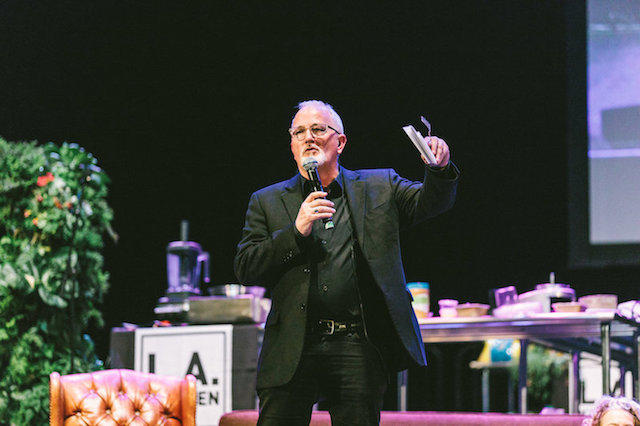
LA Kitchen CEO Robert Egger
In that spirit, Egger noted the clash that erupted between Chef Andres and the FEMA bureaucracy in the aftermath of Hurricane Maria’s devastation of the island of Puerto Rico last year. A devastation that saw people desperate for shelter, clean water and food. “In fact, FEMA told you pretty much, ‘Don’t let the door hit you on the way out in Puerto Rico, right?” says Egger.
“Yes but the men and women of FEMA were amazing,” says Andres. “They are loving, caring people. Sometimes it’s the system that doesn’t give the people the opportunity to serve the people. But they kicked me out of FEMA with six armored guards and I felt so cool. I wish my daughters saw me. And they kicked me out because you know what I had with me? I had the power of the people who asked to be fed. And for that they kicked us out. And you know what we did? We fed them. All the chefs of Puerto Rico came together …and …they say that life starts at the end of your comfort zone. And what we did is move away from our comfort zone, which was trying to do something we kind of never did at that scale. We didn’t have kitchens initially and we didn’t have people. What we did was ask, ‘Who is out there who wants to feed the people of Puerto Rico?’ And thousands of voices came to help. Thousands of men and women of Puerto Rico came to help. And we went from twenty volunteers the first day to more than 20,000. And we went from one kitchen to twenty-three kitchens. And we went from serving a thousand meals the first day to 3.5 million meals the last up to today.”
Andres introduced each of The Power of Food panelist with the endearing intro, ‘the only, the one!” noting, “It’s so funny. They put me with my English introducing everybody. Only in America!” All of the panelists, Ron Finley, Zooey Deschanel, Nyesha Arrington and Susan Feniger, have made an indelible impression in the LA food scene. Each had a powerful message about the element of humanity that is necessary to any meaningful discussion about food.
Also fighting bureaucracy, this time from the city of Los Angeles, was Ron Finley who is known as “The Gangsta Gardener.” Growing up in South Central Los Angeles, he understood what it was like to have to drive miles away from home to purchase fresh, organic produce. One day, he decided to plant vegetables in the curbside dirt strip (parkway) in front of his home. That set him on a collision course with LA city officials. “I was a criminal because I planted a damn carrot on the sidewalk. It got to a point where…you see what people don’t see about these areas that they call, ‘underserved’ and ‘disadvantaged.’ They’re underserved because you’re ass don’t serve them.” That’s the only reason they’re underserved.”
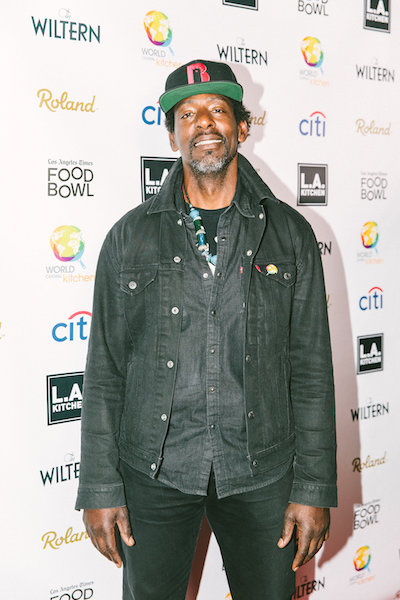
Ron Finley at The Power of Food event for LA Food Bowl 2018 at the Wiltern Theater.
Finley evoked enthusiastic applause and laughter by noting, “But when the complexion of that area changes and you have women who don’t need jobs because their husband works at the stock market or whatever, and they’re pushing strollers with their fuckin´ Lu Lu Lemon pants on and half cafe latte foam buttercream bullshit drink in the middle of the day, all of a sudden there’s services and there’s conveniences and there’s opportunity.”
“People talk to me and they’re like, ‘Ron it’s so beautiful man, you’re giving people hope. And I say, ‘Fuck hope’. Because you can’t do nothing with hope but hope. But guess what you can do with opportunity? And that’s what I want people to have. People in these so called ‘underserved neighborhoods’ where corporations are making billions and billions of dollars on their sickness on their illness serving them poison ass food, I wasn’t going for it so I told the city, ‘Bring it. Bring what you got ‘cause I’m not stopping.’ And that’s how I got where I am. Grass grows on these parkways because they put it there. What people don’t realize is we have the opportunity, like Jose, to change the design of this bullshit, ‘cause it’s by design. It’s a system that’s by design. People are in poverty by design; the stuff that we value is by design.”
“To me, gardening equals freedom. It ain’t even about food. It’s about freedom and people don’t see that. It’s the opportunity for you to be self-sustaining. Which, we’re not.” Finley’s comments were met with some of the loudest cheers of the night. Who won the battle for the right to plant fruits and vegetables in LA city parkways? Finley did. As of 2016, Angelenos no longer face citations for planting gardens in the parkways of their property.
Egger emphasized the theme for the evening as the spotlight shone on the next panelist. “Again, what we’re after tonight is not the instagramable food, it’s The Power of Food,.” Egger addressed Chef Susan Feniger, co-founder of The Border Grill, “You spent a lot of time traveling the world and really exploring that power at the street level.”
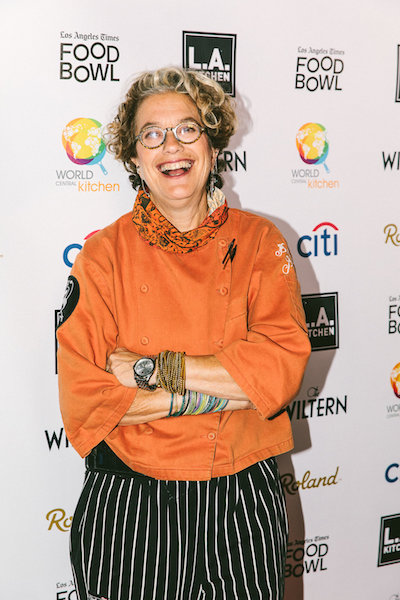
Co-founder of The Border Grill, Susan Feniger.
“I mean, I’m not doing near the powerful work that these guys are doing,” says Feniger. “But I have spent many years traveling in this country and traveling around the world. The thing I’m most drawn to are street food and eating and learning a culture through the street food vendors. Whether it’s one person in India, sitting in front of a little fire in the ground and making something really delicious and selling it, what I feel that does is open up the culture, the neighborhood, to be able to bring a community together and its an equalizer. You may have someone from a corporation and someone from the neighborhood, someone with a lot of money, someone without a lot of money, and it’s bringing opportunity to the neighborhood, to that person, to be able to make a living.”
Fenniger expressed her approval of the recent law that Los Angeles passed allowing street vendors to sell their food without fear of being cited. “It got passed I believe here in Los Angeles, mainly because it’s going to make money for the city. That’s fine because it’s going to bring inexpensive food potentially, to areas all around the city. Give people jobs, be able to bring interesting, unusual food to different parts of the city and that’s something that’s been crazy stupid to not allow in this city.”
Although actress Zooey Deschanel might be best known for her roles in film and TV, through her company The Farm Project, she works to ensure access to healthy food. Part of how she does that is through the servicing and creation of food towers, a means of growing fruits and vegetables utilizing a vertical, aeroponic tower structure. The inspiration for The Farm Project was Deschanel’s pregnancy with her first child.
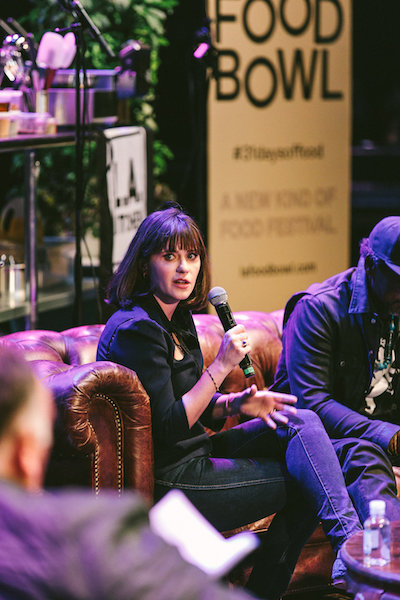
Actress Zooey Deschanel attends LA Food Bowl’s Power of Food event with LA Kitchen at the Wiltern in Los Angeles.
“We were wanting to feed the baby the most nutritious food and it kind of started this kind of an upward spiral and we started The Farm Project,” says Deschanel. “Basically, we’re trying to make fresh, sustainable, local food as easy, affordable and accessible as packaged alternatives. It’s really easy to buy a box of chips or crackers but it’s not that easy and it’s not that affordable to buy fresh food and we have all these local farmers. It’s hard to make a living being a farmer and they need support. We’re trying to build up the infrastructure through a lot of different means and one of them is gardens. So you can grow on a balcony, you can grow on a back yard.”
Deschanel stressed that The Farm Project is making an effort to increase affordability of their product. “We actually get local farmers that do the seedlings for the towers. But that’s just one part of our business. We want to support local farmers, we want to get people to grow in any space that they can. We want people to be gardeners, we’re trying to get people to ask questions about their food. We want it to be easy and we want it to be affordable because we realize we could go to Whole Foods and buy organic food, but it was expensive and that sucks. Why should I be able to buy that and somebody else not be able to? I don’t think that’s fair. That’s why we started Farm Project because the more you buy local food and organic food; you actually drive down costs by creating demand for that.”
“I’ve been cooking about 16 years especially in this city,” says Chef Nyesha Arrington, founder of Native. I am very, very, very passionate about Los Angeles. I am very passionate about education. I am very passionate about sustainability; I am very passionate about taking care of our people, all people and humanity. I am a chef by trade and I am wired to just care, care a lot for people. I am living my best me when I cook, and celebrate culture through food. That is who I am. I come from a bi-racial background. My mother’s Korean, my father’s African American and I’m Cherokee Indian, and I taste culture through food and that is what I strive to evoke in people every day when they taste food from me. The conversation today is food is powerful, right? We’re talking about the power of food. I resonate and try to create a ripple and a wave of thought every single day that I cook through culture, through food, through sustainability, through sourcing.”
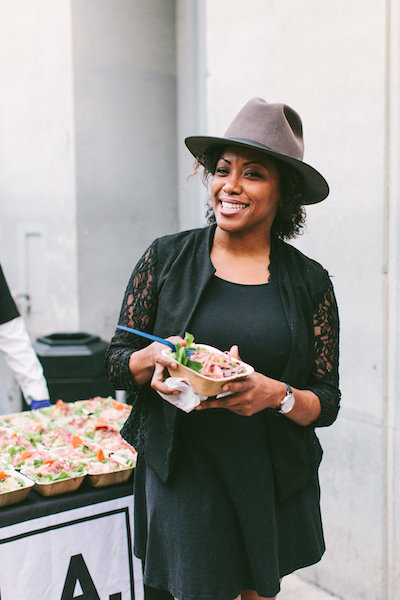
Nyesha Arrington
“I think in a world where technology is driving our world, food and the power of food is what makes us human beings,” says Arrington. “Being able to connect in a room like this and being connected with Food Bowl, it’s so powerful and I feel that fit. LA Kitchen and Robert, I was able to work with your team at All Star Chef’s Classic Men. If those guys didn’t leave an impactful meaning in my life, seeing in these people, real people, real LA people, it is sourcing responsibly, ethically and knowing the growers, knowing our carbon footprint, knowing how to impact the next generation to come and having a planet for people to be able to create. Like, is it going to be here? I want to know and I want to be a part of that conversation. That is my life legacy.”
It would be difficult to have a meaningful discussion about The Power of Food in America without acknowledging the contributions of the undocumented men and women who do so much of the manual farm labor. “The salads that every single senator and congressman, Republican or Democrat, the salads they are eating, chances are that those romaine lettuces, those tomatos, those vegetable, they have been picked up by an undocumented person working in a farm in America,” says Andres. “Immigration reform is not a problem for us to solve, immigration reform is an opportunity for America to seize, if we really want to take better care of America, we need not to be forgetting the people, the men and women that everyday work 12-14 hours a day under the very hot sun to make sure that you and I, my children and your children, have a plate of decent vegetables on their plate. We need to make sure that immigration reform passes sooner rather than later. That’s part of the food movement too.”
Finley agreed adding, “Half these people that pick our food, they can’t even afford the food that they pick! Who thinks about that? We really need to. What is the true cost of food? Do you think about what they’re being sprayed with on these fields, bent over all day? No. And that’s just serious, especially when you see it. Have you thought about the cities in California that have no water? The water has to be trucked in. Does anybody know about this? So this is the kind of shit that we need to fix because guess what? They’re not doing it. So we all need to get up off our asses and change something. Fix what you do and move on to fix something else. And that’s what needs to happen. If you eat food and you wear clothes, you’re in the agriculture business.”
The Power of Food event was held in conjunction with L.A. Kitchen. L.A. Kitchen offers training in the culinary arts by industry professionals to people who were formerly incarcerated, homeless or in foster care. L.A. Kitchen also strives to provide nutritious meals to social service agencies serving the greater Los Angeles area. For more information on L.A. Kitchen as well as the other organizations and restaurants mentioned in this article, please visit their sites.
Cover photo (l. to r. Susan Feniger, Zooey Deschanel, Jose Andres, Ron Finley and Nyesha Arrington) and all other photos courtesy of Jennifer Johnson.
Follow LA ELEMENTS on Twitter and Instagram. Like us on Facebook.

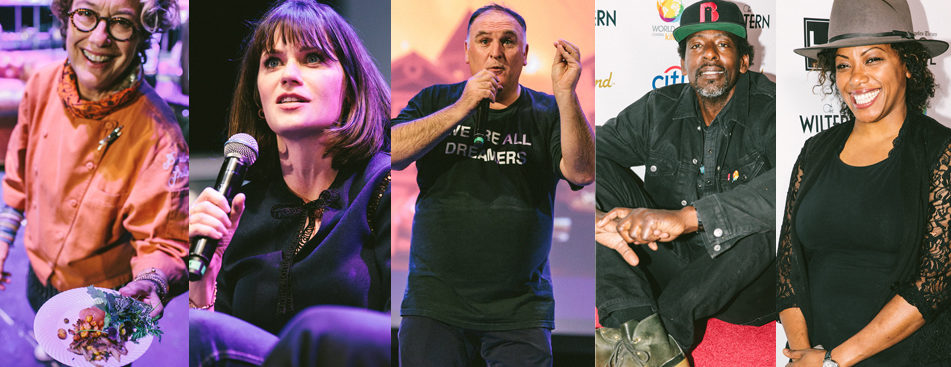
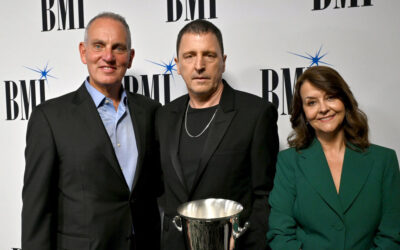


No Comments